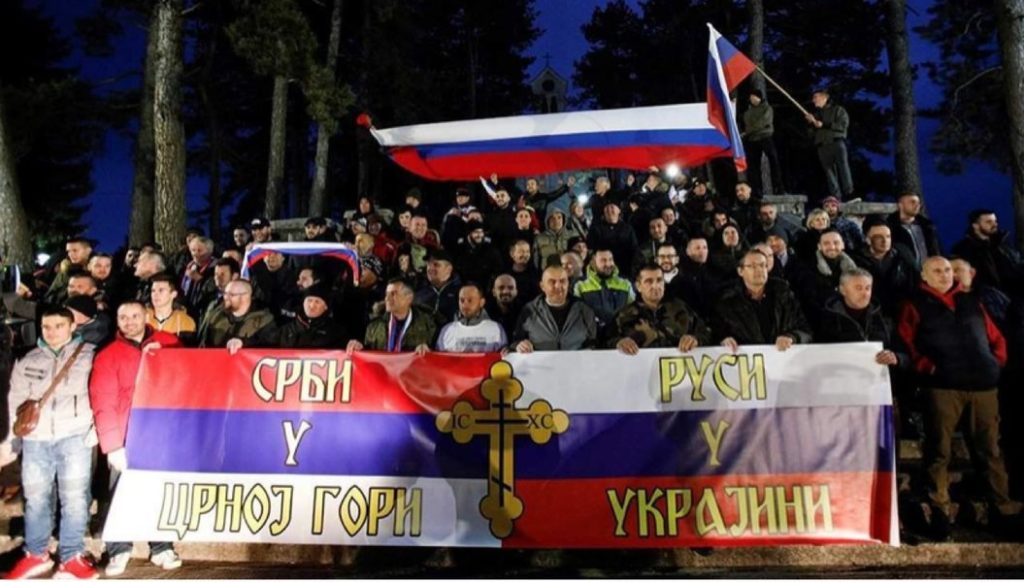Author: Vahan Martirosyan
After the outbreak of full-scale war, Russian citizens, as is well known, began to flee their country in droves. This wave took a particularly massive character after the announcement of mobilization, in September 2022. Entire families fled, regardless of social status and political views, ordinary citizens and bankers, famous artists and scientists. In the kilometer-long lines at borders and airports, both the rare opponents of the war and those who unquestioningly supported the Russian invasion stood side by side. Those who were lucky enough to have Schengen visas in their passports naturally chose the EU zone as their countries of emigration. A special wave came to the Baltic States (the border is closer).

However, by the spring of 2023, the leaders of almost all European countries, having seen with their own eyes and having realized with horror what it is — Russian emigrants, radically changed their policy, starting to flatly refuse to issue visas to persons with passports of the aggressor country. Those who were able to enter began to be gradually expelled. Moreover, some countries began to deprive/not extend residence permits to citizens of the Russian Federation, who received the coveted document of EU residency long before the start of the war. So, already in November 2023, in Estonia, the presence of Russian citizenship almost automatically led to deportation, as well as a huge part of “immigrants” were expelled from Germany, Austria, Poland and Lithuania. And Czech President Petr Pavel openly called on the intelligence services «to closely monitor Russians in the EU.» Some European countries that are not members of the EU, such as Albania and Moldova, have also partially joined the policy of denying entry to Russian citizens. After that, the biggest part of those «rescued» from mobilization, or, as Russians themselves call it, «mogilization» (buried in a grave) fell on some states of the former USSR. Armenia, Georgia, Kazakhstan, of course, quite willingly began to host citizens of the Russian Federation, hastily creating for them all sorts of benefits and generously distributing residence permits. Also, some of the «refugees» found shelter in Turkey, in the UAE and even in Latin American countries.
Europe seemed to have completely closed its doors to the Russians, very unambiguously making it clear that it does not want to see the «Russian world» in any of its manifestations and scales.
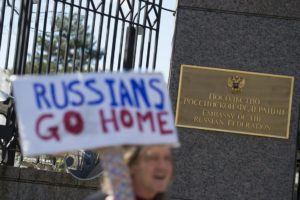
However, no matter what new bans are introduced by the EU, Russians still find ways to get if not to the most developed countries of the eurozone, then at least to their neighboring countries. So, for example Bulgaria and Hungary, sometimes issue Russians national and even Schengen visa, as well as sometimes make an exception for the entry of vehicles with Russian state registration.
However, the largest migration flow of Russians after the EU banscome to the countries of the Balkan Peninsula. It is mainly Serbia and Montenegro. And if with openly pro-Russian Serbia with their favorite «СрбииРусибраћазаувек!» (Serbs and Russians are brothers forever) everything is very clear, but the NATO member country Montenegro raises a number of rather direct questions.
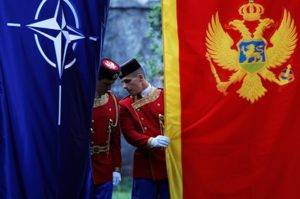
On the one hand, Montenegro willingly joins every new package of sanctions against Russia, and its current president Milatovic at every opportunity expresses his loyalty to Ukraine and even expels Russian diplomats from the country. However, on the other hand, the Montenegrin authorities, not only indiscriminately and with open arms accept «subjects» of the terrorist country, but also, following the example of Armenia and Kazakhstan, create special conditions for them to facilitate and accelerate the process of adaptation. Just for 2 years in small Montenegro, the population of which until 24.02.2022 was almost 600.000 people, more than 14 thousand Russians (!) received residence permits and permanent residence, 3.5 thousand of whom have acquired real estate. Moreover, the Ministry of Interior of Montenegro, gives temporary and permanent residence permits to Russians, that is called on «special conditions», often turning a blind eye to the lack of required documents. It is just as easy for Russian citizens to obtain a Montenegrin driver’s license. One of the largest banks in the country, Adriatica, for only 500 euros, not only opens international currency accounts for Russians without any problems, but also bypasses the known banking sanctions and conducts operations to transfer rubles from Russian banks to the euro accounts of its Russian clients. According to available data for 2023 alone, Adriatica Bank has opened more than 1000 such accounts. In addition to Adriatica, the Russians themselves, ignoring the law prohibiting currency exchange transactions for individuals, have created several dozen large communities for the physical conversion of rubles into euros. Montenegrin police try to «ignore» the activities of these communities.
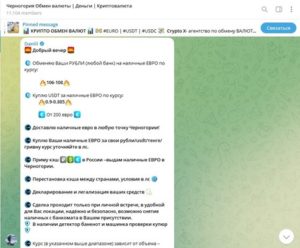
(one of the many advertisements by Russians in Montenegro offering to exchange rubles for euros and dollars.)
In addition to financial and domestic benefits, Montenegro also contributes in every possible way to the development of the cultural and entertainment industry for Russians. In just a year and a half or two years, cafes, bars, restaurants and bathhouses with exclusively Russian names, often decorated with the tricolor, portraits of V. Putin and even Z symbols, have sprouted like mushrooms in the coastal towns of Budva, Bar, Petrovac, Tivat, Kotor and Herceg-Novi. In addition, several special schools, kindergartens, theaters, Russian-language media, various foundations and development centers were opened for Russians, and even provided their own church for services in Russian.
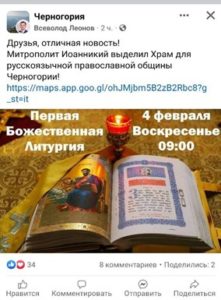
(News that the Head of the Montenegrin Church Metropolitan (Bishop) Jonaky provided a temple for Russians in Montenegro.)
The Russianization of Montenegro today has reached such an extreme that walking along the streets of some Montenegrin cities, especially in Budva and Bar, it has become almost impossible to hear Montenegrin speech. It sounds exclusively Russian, and mostly in the favorite Russian swear words.
Whether Montenegrins themselves like it is not quite clear. Some who have a personal benefit, for example, from renting apartments or villas, the prices for which with the invasion of the Russians increased by 2-3 times, are naturally very loyal, and some are just waiting, hoping that the war will soon be over, the Russians themselves «retreat», and their lives will return to their usual course. In the meantime, they have to endure and adapt to the new «Russian» realities of Montenegro.
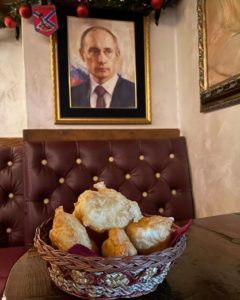
(Interior in «Russian Bar» in the center of Podgorica)
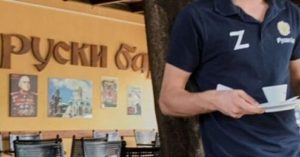
(Waiter’s uniform in «Russian Bar» in Podgorica with «Z» symbols)
As we know, one of the main components of the «Russian world» is also a criminal. Montenegro, of course, was no exception. In a conversation with me, one of the officials of the Montenegrin capital’s police, Nikolo, said that Montenegro has probably never seen such an unprecedented surge in crime. According to him, at the moment out of 10 crimes committed, 6-7 of them necessarily involve citizens of the Russian Federation. Russian crimes are very diverse, from banal domestic thefts, stabbings and drunken fights, to contract killings, kidnappings and complex financial fraud, which the local police have not even heard of before. In addition, according to Nicolo, with the arrival of the Russians, drug trafficking in the country has also increased to unprecedented levels:
«If you stand on the Podgorica-Petrovac highway and stop all cars with Russian license plates, you can be sure that in every third, if not every second, you will find some kind of drugs. Mostly synthetic drugs, amphetamines, methadone, cocaine or marijuana are also not uncommon. Over the last year they have set up whole schemes to sell drugs in their numerous bars and cafes. For example, in Budva there is a seemingly ordinary Russian cafe «Druzhba», in which, however, anyone can easily buy almost any drug. Both we and the Budva police are well aware of this, but for some reason no one has ordered us to shut down this brothel.»
In addition to crime, Russians in Montenegro also have a very developed «fifth column», which, unlike in other European countries, feels quite at ease here. There are both «ordinary soldiers» of the FSB (Russian Special Services), who without embarrassment perform tasks of almost any complexity, from holding marches in support of the so-called «Special Warfare Operation.», to burning cars with Ukrainian license plates, and agents of influence well disguised under allegedly anti-war rhetoric, with their own media, funds and NGOs. In addition, in Montenegro, and so-called cultural events are held, the declared activities of which are supposedly humanitarian and anti-war, but in reality, all these organizations are kind of satellites of Rossotrudnichestvo (Russian propaganda organization), directly or indirectly promoting the same ideas of «Russian world».
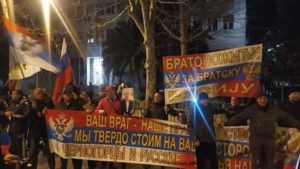
(March in Podgorica in support of the «Special Military Operation» (Russian invasion of Ukraine)
Just recently, on the day of the second anniversary of the beginning of a full-scale war, the President of Montenegro, Jakov Milatovic, once again expressed his support for Ukraine, stating that Montenegro unequivocally supports the right to freedom and the Euro-Atlantic perspective of Ukraine.
And how not to remember an old joke: «A priest comes to a brothel, takes off his cassock and underwear, and remains in one cross.
The prostitute says to him: «Father, you either take off your cross or put on your underpants.»

